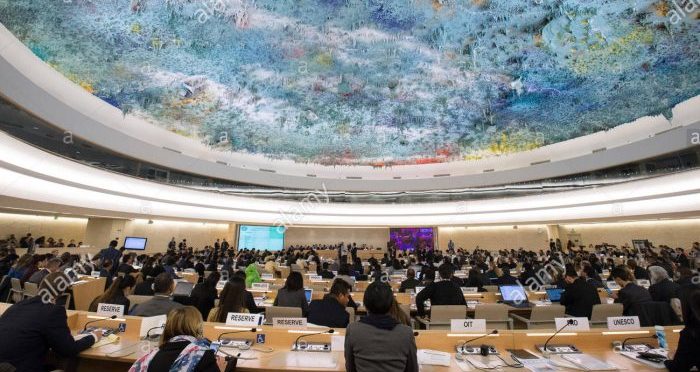
Universal Periodic Review on the situation of human rights in Iran-November 2019
On Tuesday, November 8, 2019, 111 countries participated in the Universal Periodic Review (UPR) of the human rights situation in Iran. The UPR is a peer-review mechanism whereby the United Nations member states can make recommendations to governments that are under review.
The Working Group in Geneva on Tuesday had a lot to say about the regime’s treatment of women, the execution of minors, the use of torture, and overall human rights abuses, making a total of 329 recommendations to the Iranian regime.
111 countries participated in the Universal Periodic Review (UPR) of the #HumanRights situation in #Iranhttps://t.co/fihUVcGZRR#MEK #FreeIran @USAdarFarsi pic.twitter.com/StJFqdz8QG
— MEK Iran (Mujahedin-e Khalq) (@MEK_Iran) November 14, 2019
The recommendations made by the Working Group of the UPR were adopted on November 12th at a meeting of the U.N. Human Rights Council. The MEK has reported previously that the U.N. has condemned the Iranian regime 65 times over the last four decades for its human rights abuses.
Recommendations Made
A number of countries called on Iran to ratify the
Convention on the Elimination of All Forms of Discrimination against Women (CEDAW).
Denmark, Estonia, and Moldova recommended that the regime ratify the Convention against Torture and other Cruel, Inhuman or Degrading Treatment or Punishment.
Germany called on Iran to
“ratify core international human rights conventions, in particular, the Convention against Torture and Other Cruel, Inhuman or Degrading Treatment or Punishment and the Convention on the Elimination of All Forms of Discrimination against Women.”
Germany also called on the regime to
“establish a formal moratorium on the death penalty. In particular, cease all planned executions of juvenile offenders and prohibit the imposition of the death penalty for crimes committed by minors.”
Albania called on the Iranian regime to cooperate with all U.N. Special Rapporteurs who wish to visit the country.
Sweden agreed, saying that Iran must “fully cooperate with and grant immediate and unfettered access for the Special Rapporteur on the situation of human rights in the Islamic Republic of Iran.”
simultaneously with 34th session of Universal Periodic Review, supporters of Iranian resistanc and the families of the victimes of the #1988Massacre held an exhabition outside of the United Nations Human Rights Council in Geneva.#UPR #UPRIran #UPR34 pic.twitter.com/0OhP38vV6a
— Iran Freedom (@4FreedominIran) November 8, 2019
Belgium recommended that Iran should
“abolish the death penalty at least for crimes committed by persons under 18 years of age, in accordance with its obligations under the International Covenant on Civil and Political Rights and the Convention on the Rights of the Child, and commute all death sentences for juvenile offenders.”
The United States called on the Iranian regime to immediately end the use of torture and to credibly investigate and prosecute all allegations of torture.
Ukraine called on Iran to
“remove all national law provisions that allow for punishments that amount to torture or cruel and degrading treatment.”
Australia said Iran must
“Immediately investigate all allegations involving the torture and other ill-treatment of those arrested or detained during the demonstrations in December 2017 and hold those responsible to account.”
Australia also called on the regime to
“guarantee the rights to freedom of expression, association, and assembly, and release political prisoners, including women’s rights activists, labor rights activists, environmentalists, scholars, lawyers and journalists, detained for exercising these rights.”
#Iran: #AmnestyInternational Calls for Condemnation of #Iran’s Deterioration of #HumanRights Record at the UN Human Rights Council
https://t.co/hkRSDj4NrN#MEK #FreeIran @USAdarFarsi— MEK Iran (Mujahedin-e Khalq) (@MEK_Iran) November 9, 2019
The United Kingdom called on Iran to
“Immediately demonstrate that all detainees in prison are neither tortured nor subject to cruel or inhumane treatment or punishment.”
Switzerland called on the Iranian regime to
“release all persons detained for exercising their rights to freedom of expression, association, and peaceful assembly, and repeal or amend laws and other provisions criminalizing or restricting the exercise of those rights.”
Argentina said Iran must
“guarantee freedom of expression, particularly of men and women human rights defenders and journalists, and repeal legal provisions that affect these rights.”
